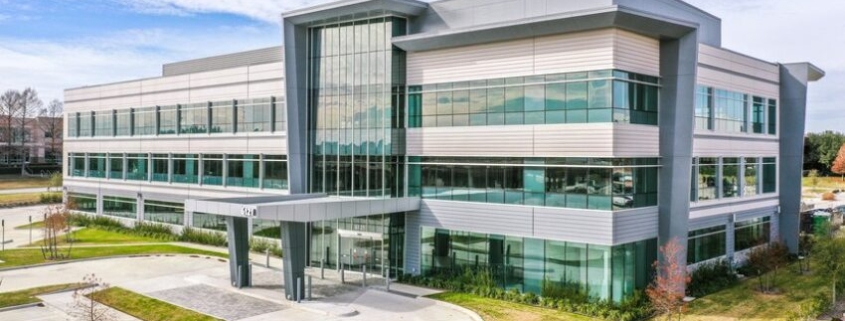Dallas-Fort Worth‘s 23-acre Pegasus Park office campus is the future landing site for life sciences firm BioLabs’ central U.S. hub.
Cambridge, Massachusetts-based BioLabs plans to open BioLabs at Pegasus Park inside the under-development Pegasus Park campus. The future tenant also plans to occupy private lab and office space at the site.

The redeveloped Pegasus Park near Stemmons Freeway in Dallas (PHOTO CREDIT: Small Investments, Lydia Hill Philanthropies and GFF)
Pegasus Park is the brainchild of J. Small Investments and Lyda Hill Philanthropies, which partnered to transform a former ExxonMobil office campus into a mixed-use development with specialty hubs and office sites dedicated to life sciences, biotech and philanthropic tenants.
To date, CoStar Group has identified 188 sites in DFW dedicated to life sciences tenants, with over 15,000 employees.
“The largest tenant so far is Alcon Laboratories, which occupies 1.6M SF at 6201 South Freeway in Fort Worth. Other DFW life and medical sciences tenants include Stryker, Abbott Labs and Pfizer,” CoStar Group Director of Market Analytics Paul Hendershot said. “With a rich history of technology and innovation, Dallas-Fort Worth is in a strong position to grow its already robust life sciences industry cluster.”
Still under development, the new life sciences campus sits off Stemmons Freeway between Southwestern Medical District and the Dallas Design District. J. Small Investments acquired the campus in 2015 from ExxonMobil and intends to convert the site into a mixed-use development offering 550K SF of office space, with a biotech hub featuring 37K SF of lab and training space.
“BioLabs is one of the biggest names in the biotech startup industry. Their decision to choose Dallas as their first location in the central U.S. is significant for our city, region and state,” CEO of LH Capital Inc. and Lyda Hill Philanthropies Nicole Small said in a statement.
Source: Bisnow






